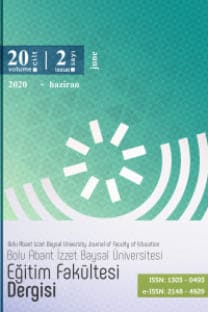NB İlgi ve Yetenek Alanları Geliştirme Programı Hafta Sonu Özel Grupları
üstün yetenekli, ilgi ve yetenek alanları, hafta sonu özel grupları, eğlenerek öğrenme, 3 boyutlu proje
NB Interest and Ability Domains Program Weekend Special Group Programs
gifted and talented, interest and ability domains, weekend special groups, learning by enjoying, 3dimenisonal projects,
___
- Aygün, B. (2010). The Needs Analysis of the Mathematics Program for the Gifted Students Attending Lower Secondary Education Schools (Master’s Thesis). Hacettepe University, Ankara.
- Baykoç, N. (2011). Üstün ve Özel Yetenekli Çocuklar ve Eğitimleri. In N. Baykoç (Ed.), Özel Gereksinimli Çocuklar ve Özel Eğitim (pp. 359-386). Ankara: Eğiten Kitap.
- Baykoç, N. (2010). Üstün ve Özel Yetenekli Çocuklar ve Eğitimleri. In N. Baykoç (Ed.), Öğretmenlik Programları için Özel Eğitim (pp. 301-337). Ankara: Gündüz Eğitim ve Yayıncılık.
- Baykoç, N.(2012). Üstün Yetenekli Çocuklar. In N.Metin (Ed.), Özel Gereksinimli Çocuklar. Ankara: Maya Akademi.
- Baykoç, N., Aydemir, D. ve Uyaroğlu B. (2013). Analyzing the Effectiveness of NB Interest and Ability Domains Weekend Special Group Programs for Gifted and Talented Students. Procedia - Social and Behavioral Sciences, 89, 171-175. 30.11.2013 http://www.sciencedirect.com/science/article/pii/S1877042813029601adresin den alınmıştır. tarihinde
- Binet, A., Simon, T. (1916). The Development of Intelligence in Children: The Binet- Simon Scale. Baltimore: Williams & Wilkins.
- Davis, G. A. & Rimm, S.B. (2004). Education of the gifted and talented (5th Ed.). Boston: Allyn and Bacon.
- Diezmann, C. M., & Watters, J. (2001). The collaboration of mathematically gifted students on challenging tasks. Journal for the Education of the Gifted, 25, 7– 31.
- Dimitriadis C. (2011). Provision for mathematically gifted children in primary schools: an Investigation of four different methods of organizational provision, Educational Review, 64(2), 241-260
- Fıçıcı, A. & Siegle D. (2008). International teachers’ judgment of gifted mathematics student characteristics. Journal of Gifted Talented International, 23(1), 22-37.
- Gagné, F. (1991). Brief presentation of Gagné and Nadeau‘s attitude scale: Opinions about the gifted and their education. Montreal: University of Québec.
- Hannah J., James A., Montelle C., & Nokes J. (2011). Meeting the needs of our best and brightest: curriculum acceleration in tertiary mathematics. International Journal of Mathematical Education in Science and Technology, 42(3), 299- 312.
- Kaplan, S. (2004). Where we stand determines the answers to the question: Can the no child left behind legislation be beneficial to gifted students? Roeper Review, 26, 124-126.
- Pantazi D. P., Christou C., Kontoyianni K., & Kattou M. (2011). A model of mathematical giftedness:integrating natural, creative, and mathematical abilities, Canadian Journal of Science, Mathematics and Technology Education, 11(1), 39-54.
- Preckel F., Götz T., & Frenzel, A. (2010). Ability grouping of gifted students: effects on academic self-concept and boredom. British Journal of Educational Psychology, 80(1), 451-472.
- Stanley, J. C. (2005). A quiet revolution finding boys and girls who reason exceptionally well intellectually and helping them get the supplemental educational opportunities they need. High Ability Studies, 16(1), 5-14.
- Tieso, C. L. (2005). The Effects of Grouping Practices and Curricular Adjustments on Achievement. Journal for the Education of the Gifted; 29(1), 60-89.
- Tomlinson, C. (2004). Sharing responsibility for differentiating instruction. Roeper Review, 26, 188-189.
- Uyaroğlu, B. (2011). Üstün Yetenekli ve Normal Gelişm Gösteren İlköğretim Öğrencilerinin Empati Becereileri ve Duygusal Zeka Düzeyleri ile Anne-Baba Tutumlarının İncelenmesi (Masters thesis). Hacettepe Üniversitesi. Ankara
- VanTassel-Baska, J., & Brown, E. F. (2005). An analysis of gifted education curriculum models. In F.
- A. Karnes and S. M. Bean (Eds.), Methods and Materials for Teaching the Gifed (pp. 75- 106). Waco, TX: Prufrock Press.
- ISSN: 1303-0493
- Yayın Aralığı: Yılda 4 Sayı
- Başlangıç: 2000
- Yayıncı: Abant İzzet Baysal Üniversitesi Eğitim Fakültesi
Zihin Engelliler Öğretmenliği Bölümü Öğretmen Adaylarının Bölümü Tercih Motivasyonları
Hasan Said TORTOP, Volkan KOÇAK, Muradiye ACAR, Esra ORUÇ, Hürü CANÖZ, Bahar KAPUSUZ, Emrah ÇOŞKUN
Down Sendromu Olan Çocuklarin Temel Kavramlari ile Ortalama Sözce Uzunluklari Arasindaki İlişki
Otizmi Olan Öğrencilere Okuma-Yazma Öğretme Konusunda Sınıf Öğretmenlerinin Görüş ve Önerileri
Emine GÜLTEKİN SEYLAN, Nihal VAROL ÖZYÜREK
Zehranur KAYA, Meltem ÖZTEN ANAY, M. Cem GİRGİN
Yetersizliği Olan Çocuklar, Aile ve Aile Eğitimi: Kavramsal ve Uygulamaya Dönük Gelişmeler
Galibiye ÇETREZ İŞCAN, Yeşim FAZLIOĞLU, Cansu PARLAK
Özel Eğitim Öğretmenlerinin Hizmetiçinde Yetiştirilme Düzeyleri
Osman YILDIRIM, Nezir ÜNSAL, Bahtiyar TOLUNAY
Soner YATGIN, Habip Mehmet SEVGİ, Soykan UYSAL
Öğretmen Adaylarının Zihin Engelliler Sınıf Öğretmenleri ve Uygulama Sınıflarına İlişkin Görüşleri
